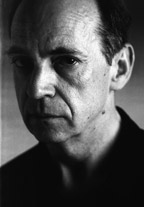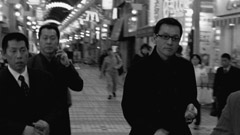Juror
Jean-Pierre Limosin
 [Juror’s Statement]
[Juror’s Statement]
I eagerly look forward to taking part in the Yamagata International Documentary Film Festival. Ever since friends began telling me about this event with great warmth and passion, it has been my goal to come to Yamagata and share experiences with its audience.
From the birth of cinema to today, what we call the documentary has always best represented the source idea of cinema—increasingly so, in my opinion. This is without doubt, because nothing compares to reality.
In 1983, Jean-Pierre Limosin co-directed Faux fuyants with Alain Bergala, which screened at the Cannes Critics’ Week. In the late 1980s, he directed Gardien de la nuit (1986) and L’autre nuit (1988), after which his focus turned to making documentaries. He made portraits of Abbas Kiarostami and Alain Cavalier. He then became interested in Japanese culture. In Japan he made Tokyo Eyes (1998) starring Takeda Shinji and Yoshikawa Hinano, Takeshi Kitano, the Unpredictable (1999, YIDFF 2007), and other films. Recent films include Novo (2002), Carmen (2005), and YOUNG YAKUZA (2007) which premiered respectively at the Locarno, Venice, and Cannes film festivals.
YOUNG YAKUZA
 FRANCE / 2007 / Japanese / Color / 35mm / 99 min
FRANCE / 2007 / Japanese / Color / 35mm / 99 min
Director, Script: Jean-Pierre Limosin
Photography: Julien Hirsch
Music: RGM
Editing: Tina Baz
Sound: Kikuchi Nobuyuki
Sound Design: François Musy
Production Company: Celluloid Dreams Productions
Source: Tamasa Distribution
20-year-old Naoki enters the yakuza world. He is initiated to the ways of general society—etiquette, spring cleaning, the rituals of new year’s greetings—and to the culture of the Japanese mafia, including their brilliant tattoos. Meanwhile, the gang’s boss quietly speaks of his thoughts about the organization today in Tokyo, where legislation to restrict mafia activities is strong. What is shifting, and what is constant during these changing times? Director Jean-Pierre Limosin of Tokyo Eyes portrays a lone leader with existential questions, committed to the yakuza’s traditional codes of conduct (jingi). Hip hop musicians RGM—Naoki’s same age—narrate the scenes with a vibrant rap score, while a suspenseful cinematography (by Julian Hirsch of Lady Chatterley and Godard’s In Praise of Love) plays out the tension between acting and reality.
